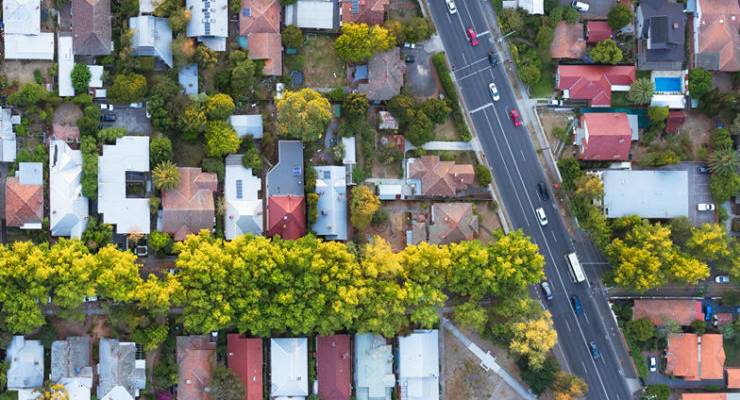
Bit by bit, the chances of the next movement in interest rates being down rather than up, are increasing. They’re still small — but bigger than they were three months ago.
We know that economic growth and jobs growth are strong — although jobs growth peaked at the end of 2017, and growth hasn’t been strong enough to really push down unemployment. We know that core inflation is just under the Reserve Bank’s target band and seemingly stuck there — indeed, would be even lower but for the actions of governments. We know that wages growth in the private sector is stuck below inflation — although we’ll get the June quarter wage price index soon, which will tell us whether the government will hit its downgraded WPI target of 2.25% for 2017-18. But on top of that is the unfolding trade war between the government’s good friend Donald Trump and China, which threatens to undermine global economic growth.
Most of all, the big constraint on a further rate cut — soaring property prices — has vanished. The July CoreLogic Index showed a national fall of -0.6%, which left average house prices down 2.4% from a year ago, their weakest since 2012. Sydney prices dropped 0.6% and have now fallen 5.4% from their August 2017 high, Melbourne prices fell 0.9% and are down 2.9% from their November high. Perth (-0.8%) and Adelaide (-0.1%) also saw falls in July, but Brisbane, Canberra and Darwin saw small gains; Hobart was flat and looks to be slowing after an 11.5% rise over the last year.
By the way, remember a couple of years ago when the government and sections of the media (you know who) were trying to get up a scare campaign about Labor’s negative gearing and capital gains tax reforms and warning that they would cause a property price collapse? Scott Morrison got badly burnt when he relied on a bullshit BIS Shrapnel report to warn of the impending apocalypse in which property prices in Sydney would fall by 6%; Peter Dutton claimed that as a result the economy would come to a “shuddering halt” and the stock market would crash. Well, prices in Sydney have now fallen 5.4% in under a year under Morrison — but he says that was “necessary” and Dutton’s sharemarket crash is nowhere to be seen. Funny that.
The softening of house prices in Sydney and Melbourne from their exuberant levels isn’t merely the removal of a constraint, it will feed through into the actions of households. As AMP’s chief economist Dr Shane Oliver reminded us earlier this week:
Ongoing home price falls in Sydney and Melbourne will depress consumer spending as the wealth effect is now going in reverse and so homeowners will be less inclined to allow their savings rate to decline. It’s consistent with our view that the RBA will leave rates on hold out to 2020 at least. Home price weakness is at levels where the RBA started cutting rates in 2008 and 2011, so we still can’t rule out the next move in rates being a cut rather than a hike.
Given what’s been happening with house prices in Sydney and Melbourne, imagine what would have happened if the Reserve Bank had followed the advice of Michael Stutchbury at the Fin Review and neoliberals like Warwick McKibbin and Warren Hogan, to lift interest rates regardless of the impact on the economy and employment. That would have risked turning what is an orderly end to surging property prices into a full-scale rout as investors fled the market and households curbed their spending to meet higher repayments. Luckily, as the RBA pointedly noted in its July meeting decision, it decided to remain a source of “stability” in the economy instead.
Has there been any acknowledgement from the AFR about how badly wrong its campaign for punitively higher interest rates was? No fear. This week the AFR was trying to puff the property market softening into a full-blown crisis, quoting some economic research outfit to warn a “credit crunch could hit house prices by 20%” while a page one story suggested “falling prices, no tenants, worse to come”. Bugger consistency, just go for the hype eh?









I suppose someone has to read the AFR and the Oz to find what the current crap is that they are spruiking….glad it isn’t me BK.
I agree, the sensationalism that either are prepared to publish even when it may be damaging to their so called field of expertise is incredible.
By all means cut interest rates, Philip. Again. By all means cut corporate tax rates too, Mal, if you really want. Hey, why not let’s abolish all taxes, and leave piles of cash on an all-you-can-carry-away table outside the RBA.
But…for the love of god:
Would it be asking too much to tweak housing investment tax policy, too? Even just a bit? Otherwise all you’ll be doing is piping the freed-up investment dollars disproportionately right back into the housing Ponzi scam. Again. And doing much less than it could/should for real growth jobs/wages = spending cash. Rinse & repeat. It’s just trying to start an already-flooded engine by pump-priming yet more fuel into a carb that’s not even connected properly to the right cylinders.
Why is this so hard to understand? Or…even…is it not correct?
Anyone, anyone…Bueller…?
Dutton’s sharemarket crash is as credible as Abbott’s budget emergency. As soon as Abbott became PM the emergency disappeared, the bloke’s a genius.